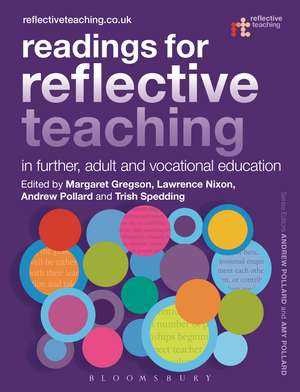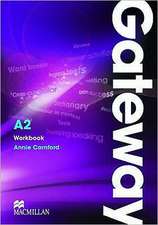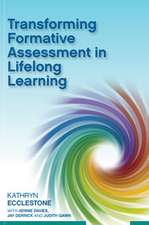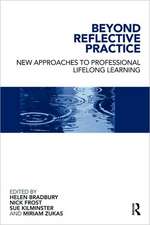Readings for Reflective Teaching in Further, Adult and Vocational Education: Reflective Teaching
Editat de Dr Margaret Gregson, Lawrence Nixon, Professor Andrew Pollard, Trish Spedding Dr Amy Pollarden Limba Engleză Paperback – 25 feb 2015
| Toate formatele și edițiile | Preț | Express |
|---|---|---|
| Paperback (1) | 223.50 lei 3-5 săpt. | |
| Bloomsbury Publishing – 25 feb 2015 | 223.50 lei 3-5 săpt. | |
| Hardback (1) | 895.59 lei 6-8 săpt. | |
| Bloomsbury Publishing – 25 feb 2015 | 895.59 lei 6-8 săpt. |
Preț: 223.50 lei
Preț vechi: 247.81 lei
-10% Nou
Puncte Express: 335
Preț estimativ în valută:
42.77€ • 46.44$ • 35.93£
42.77€ • 46.44$ • 35.93£
Carte disponibilă
Livrare economică 01-15 aprilie
Preluare comenzi: 021 569.72.76
Specificații
ISBN-13: 9781472586490
ISBN-10: 1472586492
Pagini: 352
Dimensiuni: 189 x 246 x 20 mm
Greutate: 0.64 kg
Editura: Bloomsbury Publishing
Colecția Bloomsbury Academic
Seria Reflective Teaching
Locul publicării:London, United Kingdom
ISBN-10: 1472586492
Pagini: 352
Dimensiuni: 189 x 246 x 20 mm
Greutate: 0.64 kg
Editura: Bloomsbury Publishing
Colecția Bloomsbury Academic
Seria Reflective Teaching
Locul publicării:London, United Kingdom
Caracteristici
Brings together key readings influencing current discussion of enduring educational issues in the FAVE sector which will be invaluable to trainees and practicing teachers in their initial and continuing professional development
Notă biografică
Margaret Gregson is Director of the Sunderland University Centre for Excellence in Teacher Training (SUNCETT) and Professor of Vocational Education at the University of Sunderland, UK.Lawrence Nixon is Senior Lecturer within the Faculty of Education and Society, University of Sunderland, UK.Andrew Pollard is Professor of Education and supports educational research at IOE, UCL's Faculty of Education and Society, University College London, UK and the University of Bristol, UK. He is the Series Editor of the Reflective Teaching series.Trish Spedding is Co-Director of the Sunderland University Centre for Excellence in Teacher Training (SUNCETT), UK.
Cuprins
IntroductionPart I: Becoming a reflective professional1. Identity. Who are we, and what do we stand for?2. Learning. How can we understand learner development?3. Reflection. How can we develop the quality of our teaching?4. Principles. What are the foundations of effective teaching and learning?Part II: Creating Conditions for Learning5. Contexts. What is, and what might be?6. Relationships. How are we getting on together?7. Engagement. How are we managing behaviour?8. Spaces. How are we creating environments for learning?Part III: Teaching for Learning9. Curriculum. What is to be taught and learned?10. Planning. How are we implementing the curriculum?11. Pedagogy. How can we develop effective strategies?12. Communication. How does language support learning?13. Assessment. How can assessment enhance learning?Part IV: Reflecting on Consequences14. Outcomes. How do we monitor student learning achievements?15. Inclusion. How do we manage equality and diversity?Part V: Deepening Understanding17. Expertise. Conceptual tools for career-long fascination?18. Professionalism. How does reflective teaching contribute to society, and to ourselves?BibliographyIndex
Recenzii
This important new text uses an innovative design to bring together key knowledge in further, adult and vocational education from experts both past and present, from the UK and across the globe. And, the timing could not be better. As the recommendations from the Commission on Adult Vocational Teaching and Learning report are implemented and the Department for Education funds a new research centre to research vocational education, a research informed text such as this sets the scene for a promising future for further, adult and vocational education.
This wide-ranging and richly diverse collection of readings exemplifies, celebrates and justifies the power and effectiveness of the reflective practitioner tradition in learning and teaching. The readings - ranging from classical theories to contemporary practical programmes - provide a wealth of resources for teachers, learners, academics and policy-makers who are committed to the continuous improvement of learning and teaching through reflective practice strategies. It should prove an invaluable reference source for staff and students in further, higher and adult education.
The articles in Readings for Reflective Teaching in Further, Adult and Vocational Education draw on significant research and activity over many years and in so doing highlight the need to reconsider the pertinent issues in further and vocational education. In particular, the need to refocus on developing quality 'education' and not just training and skills development, if learners, societies and economies are to be prepared to meet the challenges of an evolving, technology driven society in a globally connected world. Another important consideration is to recognise the professionalism of teachers/practitioners in developing and sustaining learners on their journey of discovery. They need to reclaim the mantle of a professional teacher/educator which has been debased and devalued for many years by industry, policy makers and the community. Further and vocational education is more than skills development and just-in-time training - it is about shaping the societies we wish to inhabit. Readings for Reflective Teaching in Further, Adult and Vocational Education provides wide-ranging examples, discourse and future thinking to guide the current and next generation of practitioners to enact this vision.
Readings for Reflective Teaching in Further, Adult and Vocational Education effectively draws on a range of classic and current literature from both UK and international perspectives, alongside promoting new concepts and ideas of post-compulsory pedagogy. This book, which stimulates critical reflection, is an essential text for teachers, tutors, mentors, teacher trainees and indeed other professionals who are working in the ever changing and challenging world of further, adult and vocational education. It promises to benefit all parties alike.
Readings for Reflective Teaching in Further, Adult and Vocational Education provides an excellent complement to Reflective Teaching in Further, Adult and Vocational Education. The extensive range of over 60 readings includes some "classics" (from Vygotsky, Dewey, Stenhouse, Bruner and others) that have stood the test of time, as well as more contemporary examples (from Coffield, Biesta, Kress and others). These readings will prove invaluable to both student teachers who are encountering them for the first time and also experienced vocational educators who are refreshing their familiarity with key texts and new contributions to the field. The readings provide a very effective compact and mobile library which should be part of every vocational educators resource base.
From Aristotle to Vygotsky and from session planning to digital literacies, this book introduces a very wide range of often intriguing and always relevant extracts of writing to inform teachers in further and vocational education. Whilst readings are made accessible through careful editing, this excellent book remains, nonetheless, properly demanding. Here readers will find ideas that will challenge and inspire their practice.
Great compendium of resources covering key debates relevant to the often ignored FE sector. A very useful collection.
This wide-ranging and richly diverse collection of readings exemplifies, celebrates and justifies the power and effectiveness of the reflective practitioner tradition in learning and teaching. The readings - ranging from classical theories to contemporary practical programmes - provide a wealth of resources for teachers, learners, academics and policy-makers who are committed to the continuous improvement of learning and teaching through reflective practice strategies. It should prove an invaluable reference source for staff and students in further, higher and adult education.
The articles in Readings for Reflective Teaching in Further, Adult and Vocational Education draw on significant research and activity over many years and in so doing highlight the need to reconsider the pertinent issues in further and vocational education. In particular, the need to refocus on developing quality 'education' and not just training and skills development, if learners, societies and economies are to be prepared to meet the challenges of an evolving, technology driven society in a globally connected world. Another important consideration is to recognise the professionalism of teachers/practitioners in developing and sustaining learners on their journey of discovery. They need to reclaim the mantle of a professional teacher/educator which has been debased and devalued for many years by industry, policy makers and the community. Further and vocational education is more than skills development and just-in-time training - it is about shaping the societies we wish to inhabit. Readings for Reflective Teaching in Further, Adult and Vocational Education provides wide-ranging examples, discourse and future thinking to guide the current and next generation of practitioners to enact this vision.
Readings for Reflective Teaching in Further, Adult and Vocational Education effectively draws on a range of classic and current literature from both UK and international perspectives, alongside promoting new concepts and ideas of post-compulsory pedagogy. This book, which stimulates critical reflection, is an essential text for teachers, tutors, mentors, teacher trainees and indeed other professionals who are working in the ever changing and challenging world of further, adult and vocational education. It promises to benefit all parties alike.
Readings for Reflective Teaching in Further, Adult and Vocational Education provides an excellent complement to Reflective Teaching in Further, Adult and Vocational Education. The extensive range of over 60 readings includes some "classics" (from Vygotsky, Dewey, Stenhouse, Bruner and others) that have stood the test of time, as well as more contemporary examples (from Coffield, Biesta, Kress and others). These readings will prove invaluable to both student teachers who are encountering them for the first time and also experienced vocational educators who are refreshing their familiarity with key texts and new contributions to the field. The readings provide a very effective compact and mobile library which should be part of every vocational educators resource base.
From Aristotle to Vygotsky and from session planning to digital literacies, this book introduces a very wide range of often intriguing and always relevant extracts of writing to inform teachers in further and vocational education. Whilst readings are made accessible through careful editing, this excellent book remains, nonetheless, properly demanding. Here readers will find ideas that will challenge and inspire their practice.
Great compendium of resources covering key debates relevant to the often ignored FE sector. A very useful collection.

















